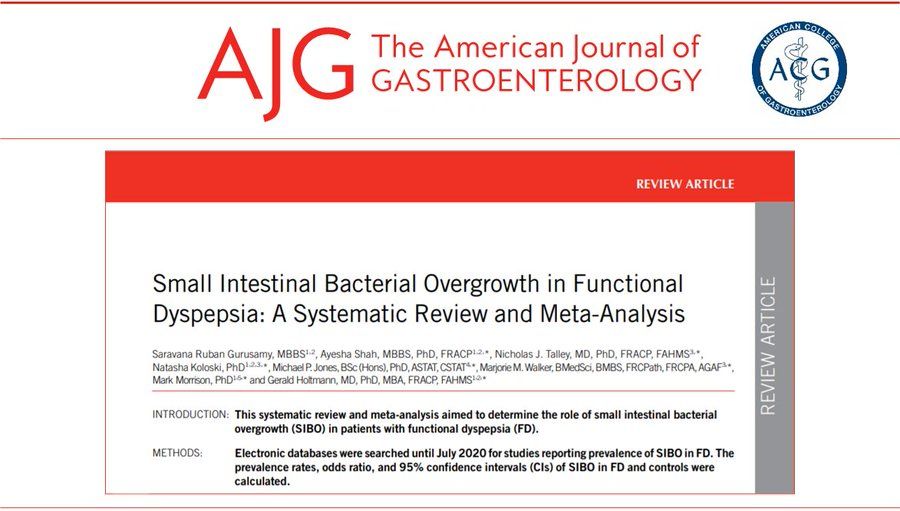 A new study found that there may be an association between Functional Dyspepsia (FD) and Small Intestinal Bacterial Overgrowth (SIBO). Small intestinal bacterial overgrowth in functional dyspepsia: a systematic review and meta-analysis, which examined the relationship between Functional Dyspepsia and SIBO, was published in the May 2021 edition of The American Journal of Gastroenterology.
A new study found that there may be an association between Functional Dyspepsia (FD) and Small Intestinal Bacterial Overgrowth (SIBO). Small intestinal bacterial overgrowth in functional dyspepsia: a systematic review and meta-analysis, which examined the relationship between Functional Dyspepsia and SIBO, was published in the May 2021 edition of The American Journal of Gastroenterology.
Breakdown of FD versus SIBO
Functional dyspepsia is a chronic gastrointestinal disorder characterized by upper abdominal symptoms attributed to altered gastroduodenal function. According to the Mayo Clinic, it is a term for “recurring signs and symptoms of indigestion that have no obvious cause” and can also be referred to as non-ulcer stomach pain or non-ulcer dyspepsia.
SIBO is one of the most widely recognized and established forms of microbial dysbiosis, which is an imbalance of gut bacteria proportions. The presence of SIBO is tested using a hydrogen and methane breath test, which is a simple and non-invasive diagnostic test that can be taken in the comfort of a patient’s home.
Examining the FD and SIBO Relationship
Many studies have reported an increased prevalence of SIBO in patients with FD. It is thought that this may be because one of the risk factors for developing SIBO is the use of a proton pump inhibitor (PPI), which is a standard treatment for FD. PPIs impair the acid barrier of the stomach, which puts the patient at potential risk for SIBO.
Overall, there have been seven studies that have reported a prevalence of SIBO in patients with FD. These studies found, using breath tests, that the prevalence of SIBO in FD patients was 32.7%. Four of the studies used the glucose breath test and the other three used the lactulose breath test. The lactulose breath test reported a higher prevalence of SIBO in FD patients than the glucose breath test.
Four of the seven studies reported a prevalence of SIBO in FD subtypes. Two studies reported on SIBO prevalence in patients with FD alone, IBS alone, and those with an overlap of the two. It was found that SIBO prevalence was numerically higher in patients with FD alone compared to those with an overlap of FD and IBS.
There is room for continued investigation of this relationship. With this being the first systemic review and meta-analysis of FD and SIBO, more research will need to be done to further analyze the association between FD and SIBO. Confirming a relationship between FD and SIBO could lead to improved FD treatments that target SIBO.
Citation: Gurusamy SR, Shah A, Talley NJ, Koloski N, Jones MP, Walker MM, Morrison M, Holtmann G. Small Intestinal Bacterial Overgrowth in Functional Dyspepsia: A Systematic Review and Meta-Analysis. Am J Gastroenterol. 2021 May 1;116(5):935-942. doi: 10.14309/ajg.0000000000001197. PMID: 33734110.

